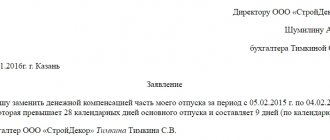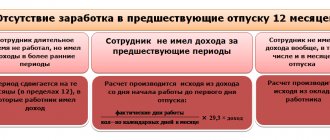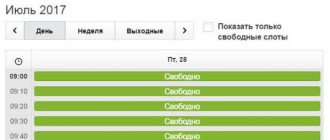Legal requirements
Article 124 of the Labor Code states: you cannot work for more than 2 years without rest. And this does not depend on the employee’s wishes - the employer must literally force him to go on vacation.
We have already written that the vacation schedule (form T-7) is a binding document - this applies to both the employer and the employee. These are the norms of Article 123 of the Labor Code of the Russian Federation. In other words, if you include a workaholic employee in the vacation schedule, then he will not be able to “get out” of it. But it should be remembered that 2 weeks before the start of the vacation, the employee must be notified about it - in writing, signed. You also need to calculate vacation pay and pay it. If all these conditions are met, then there will be no claims against the employer during a labor inspection.
However, in practice, everything usually happens differently - previously ungranted leave must be issued urgently.
28 days annual leave cannot be replaced with money
Each employee with an employment contract is entitled to 28 calendar days of vacation per year. Vacation pay is retained. On a part-time basis, the number of days is not reduced. Non-working holidays are not counted towards vacation - Art. 115, 120 Labor Code of the Russian Federation.
These 28 days cannot be replaced by monetary compensation. Even when everyone doesn't mind. The employee must take a vacation. The exception is when he did not have time to rest and quit or the company was in a rush situation - this will be discussed below.
Vacations can be divided into parts. But one of the parts must be at least 14 days. The remaining days can be scattered throughout the year. Splitting up vacation is a crutch for the employer if there is no one to replace the employee for a whole month - Art. 125 Labor Code of the Russian Federation.
The working year for calculating vacation begins from the date the employee was hired, and not from the first of January. For example, the studio entered into an employment contract with a seamstress on May 20, 2021. This means that the seamstress must take 28 days off until May 20, 2022. This follows from paragraph 1 of the Rules of the People's Commissariat of the USSR dated April 30, 1930, No. 169.
The first time an employee rests is six months after being hired. Unless the employer doesn't mind letting you go early. Early leave must be given to pregnant women before maternity leave, minors and adoptive parents of children under three months old.
Then the employee goes on vacation as scheduled. But parents of disabled children, families with many children, minors and veterans choose their place in the schedule themselves. And a pregnant woman has the right to take a vacation completely unscheduled - before going on maternity leave or immediately after - Art. 122, 123, 260, 262.1, 262.2, 267 Labor Code of the Russian Federation.
Article: how to send an employee on vacation
The employer approves the vacation schedule two weeks before the start of the year. That is, until December 17th. The employee is notified of his leave two weeks in advance.
The employee is required to go on vacation as scheduled. He cannot choose “double vacation pay” instead of rest. Just by choice, be at work and not rest either. In one case, an employee tried to prove that he was not required to rest. At this time there was downtime at the enterprise. The court said that going on vacation is mandatory. Downtime does not cancel the schedule. The employer has the right not to allow the employee into his territory during vacation - case No. 33-1123/2018.
Last year's vacation on schedule
How to properly grant last year's leave? At the request of the employee or by inclusion in the schedule? There are supporters of both methods.
The first refer to Article 124 of the Labor Code of the Russian Federation: it states that the transfer of vacation is carried out upon application .
Download Application for transfer of leave
Another part of accountants and personnel officers believe that this does not exclude the need to include “overdue” vacation in the schedule. After all, the employee may not write a statement, and then there will be no other grounds to send him on leave.
Article 124 deals with a situation where the employer did not warn the employee 2 weeks in advance and did not give him vacation pay. In this case, indeed, the employee should receive a leave application.
Compensation for vacation and tax claims
When paying a large compensation, the employer risks entering into a dispute with the tax authorities. On their part, a question may arise: why was compensation for all 4 years included in income tax expenses?
The fact is that, in accordance with Art. 255 of the Tax Code of the Russian Federation, when calculating income tax, only compensation in accordance with labor legislation should be included in labor costs. At the same time, labor legislation directly prohibits the failure to provide annual paid leave for two years in a row (Article 124 of the Labor Code of the Russian Federation).
As a rule, the employer challenges the actions of the tax authorities through the court, referring to Art. 127 of the Labor Code of the Russian Federation, which states that in accordance with the Labor Code, he is obliged to pay compensation to the employee for all unused vacations.
Current and overdue leave: what is the frequency?
What kind of vacation should be provided first - the one due in the current year or for the previous period? And here in practice 2 approaches are used:
- Current leave is granted first , since it is due annually. The possibility of such an approach is confirmed by Rostrud’s letter No. 473-6-0 dated March 1, 2007, which states that there are no provisions in the Labor Code for granting vacations in chronological order. Therefore, there is no violation in going on “current” vacation first.
- Last year's leave is granted first . If several of them have accumulated, for example, over the period since 2021, then the sequence is as follows: vacation for 2021, then for 2021, and lastly - for the current 2021. This does not contradict the above-mentioned letter from Rostrud; the requirement of Article 122 of the Labor Code of the Russian Federation to provide leave this year is also being fulfilled. In addition, in this case the employer takes steps to reduce the scope of its violation.
The choice remains with the employer - it should be reflected in an order or other local act.
Concept
If, due to production needs or other reasons, this year it was not possible to take all the days that you are entitled to, then this balance is called unused vacation . For subordinates, forgetful managers or workaholics, unused vacation days tend to accumulate and increase.
Occurrences:
- forgot to register according to the vacation schedule;
- called back from vacation, but the balance was not provided;
- the employee himself does not want to rest, hoping to “earn extra money” with compensation.
Is it possible to take vacations from previous years?
Article 122 of the Labor Code of the Russian Federation talks about the employer’s obligation to provide annual leave to employees .
Duration - no less than 28 calendar days (Article 115 of the Labor Code of the Russian Federation), payment - no less than the average level of earnings for the year . For workers employed in jobs with special working conditions, rest should be longer. The duration established in excess of 28 days is called additional paid leave (Article 116 of the Labor Code of the Russian Federation).
If the number of unused vacations has accumulated over a period of more than two years, the enterprise falls under administrative liability.
The fine under Article 5.27 of the Code of Administrative Offenses will range from 30 to 50 thousand rubles , and regular failure to comply with legal guarantees for employees threatens the administration with suspension of activities for up to three months or disqualification of responsible persons for a period of one to three years.
It turns out that the company should be more interested in adhering to the vacation schedule than the employee. The transfer is considered an exceptional case and is allowed only due to a possible disruption in the normal rhythm of the organization’s work (Article 124 of the Labor Code of the Russian Federation). Read on to find out what documents are needed to reschedule your vacation.
How long can you not go on vacation?
Every employee can take advantage of the right to paid vacation after six months of working in the company. According to the provisions of current legislation, the standard duration of vacation is at least 28 days . In the event that during the first year of work an employee did not go on vacation, the rest days are automatically transferred to the next year, but they never expire.
Compliance with the vacation schedule is mandatory for both the employee and the employer. An employee does not have the right to unilaterally refuse to comply with the vacation schedule approved by the employer. An employee’s refusal to take regular leave can be considered a violation of labor discipline, which entails disciplinary action.
The responsibilities of the organization’s HR department include tracking the duration of the required vacation using employees’ personal cards and notifying the company’s management about cases when an employee has not taken vacation for a long time. For its part, the company’s management must take measures to ensure that the employee has the opportunity to take advantage of the days of paid rest allotted to him.
Length of overdue leave
Let's say an employee hasn't had a vacation for 4 years. How long can his vacation last? What if he rests for the accumulated period in a row - and this is more than 100 days?
Employers in such a situation are sometimes afraid to provide such a long vacation. Meanwhile, this is exactly the best way to reduce the risk of receiving a claim from the labor inspectorate. You can safely send an employee on vacation for the entire period - this does not contradict the Labor Code.
Does unused vacation expire?
According to the provisions of the Labor Code of the Russian Federation, which regulates the rules for granting employees the next vacation, if during the reporting period the employee did not fully exercise the right to the next vacation, then next year he has the right:
- Take advantage of the right to take an unpaid vacation, and then, by writing a separate application, go on vacation at the expense of the vacation for the new period;
- Combine unpaid vacation with the vacation period for the new reporting period.
If an employee resigns , but on the date of termination of the employment relationship he has unused vacation days, then he has the right to pay off all accumulated vacation before the date of termination of the employment contract. Otherwise, the employee must be paid monetary compensation.
One way or another, annual leave does not expire; it is retained by those who continue to work in the organization and by those who quit.
Another situation occurs when there is a reorganization of the company or a reduction in staff in the event of termination of the company’s activities:
- Employees can exercise their right to take their allotted vacation days before the procedure for changing the company’s status begins;
- Employees can exercise their rights to receive monetary compensation for unused vacation;
- If none of the above methods were used, the right to leave is canceled.
ATTENTION ! In the case of additional leave, the rule comes into force according to which the employee has the right to either take advantage of the right to rest or receive 100% monetary compensation for them.
When going on maternity leave, the employee has the right to take another vacation until she goes on sick leave, or after canceling the certificate of incapacity for work issued for pregnancy. Another option would be to cancel unused leave after the woman returns from maternity leave.
IMPORTANT! There are no statutes of limitations for such vacations, in accordance with the provisions of the current legislation of the Russian Federation.
If an employee does not exercise his right to vacation, it continues to accumulate, which threatens the employer with penalties.
Transferring vacation to next year
Expert consultation
The vacation period is ending. Many workers are concerned about the question of whether it is possible to transfer vacation to the next working year. Employers are concerned about an equally important question: what to do with employees who, for one reason or another, were unable to take their vacation on time. Our expert Tatyana Almazova explained the most pressing aspects of the above problems.
***
Reasons for transferring vacation
Depending on the circumstances, vacation can be postponed either at the initiative of the employer or at the initiative of the employee. It should be noted that labor legislation does not provide for the employer’s right to unilaterally deprive an employee of vacation in the current year, thereby increasing the period between legal vacations. In any case, no matter which party the initiative comes from, the opinion of the other party to the labor relationship must be taken into account.
So, it is possible to deviate from the vacation schedule if:
- the employee’s illness occurred during the vacation period;
- the employee could not take advantage of leave due to fulfilling his civic duty, for example, serving as a juror;
- other cases are provided for by local acts of the employer or such an obligation is established by the Labor Code.
Transfer of leave at the initiative of the employer
The employer’s right to postpone vacation, although provided for by law, is, as noted above, not unlimited. As a rule, a transfer occurs when an emergency arises, when, due to the absence of a certain employee at the workplace, the entire production may come to a standstill. This could be an accident or other emergency situation within one enterprise.
However, even in this case, it is necessary to obtain the employee’s consent; you cannot immediately proceed to registering the transfer. In addition, if the employee has not reached the age of 18 or the working conditions are not normal, the transfer of leave remains prohibited and subject to consent. It is especially necessary to note the risk of prosecution in connection with failure to provide leave for more than two years in a row. This situation is unacceptable and threatens the employer with a fine of up to fifty thousand rubles.
Transfer of leave at the employee's initiative
In our opinion, the most common case of refusal of annual leave at the request of the worker himself is his illness. It’s worth saying right away that the illness of a child or another family member cannot become a reason for changing the vacation schedule.
If a certificate of incapacity for work is issued, the vacation can be postponed either to the period immediately after the end of the temporary incapacity for work, or to any other period by agreement of the parties.
The next basis specified in the Labor Code of the Russian Federation is the fulfillment of state duties. Such cases include, in particular, participation in court as a witness or juror, or work on an election commission.
Other cases, in our opinion, include, for example, the coincidence of an intermediate certification at an educational institution with a vacation period, or a medical examination, if such grounds are provided for by a local act.
Transfer of vacation by agreement of the parties
There are situations when the provision of leave in the current working year does not meet the interests of either party to the labor relationship. For example, an employee has an event coming up after a certain time in which an extension of vacation would be most welcome. In this case, the transfer of the rest period is not directly provided for by the Labor Code, however, there is no prohibition on the transfer. We believe that the basis for the transfer in the current situation will be a statement in which the start date of the vacation should be indicated. The employer should evaluate the possibility of a transfer and make a decision based on the circumstances.
Transferring part of the vacation
In most cases, it becomes necessary to transfer not all annual leave, but only part of it. This situation is not properly covered by legislation, but nevertheless it also occurs. In such cases, the general grounds for transferring leave provided for by labor legislation should be applied.
It is necessary to take into account that one of the parts of a divided vacation must be at least fourteen days in a row, and the total number of parts is not regulated by law. However, according to the Ministry of Labor, division into a large number of parts can lead to the fact that the employee will not be able to rest.
Transferring preferential leave
Often, additional vacation remains unfulfilled. Such leaves are provided for hazardous working conditions, minor employees, employees with special working conditions and some other categories. Of the listed categories, it is prohibited to transfer additional leave only to employees with hazardous working conditions. Here there is a clear connection between the work performed and the need for timely rest, since otherwise the employee’s health may suffer.
Registration of vacation transfer
To give legitimacy to the transfer of leave, it is necessary, first of all, to inform the employee about this need and obtain his consent. Next, the corresponding order is issued and the data is entered into the personal card.
Making changes to the vacation schedule
In case of postponement of vacation, it is necessary to make changes to the vacation schedule. To do this, in column 8 “Bases” you must enter the details of the order to transfer the vacation, in column 9 “Date of the intended vacation” indicate the desired start date of the vacation. Since the vacation is transferred to the next year, the new vacation schedule must reflect the days postponed from the current year.
Postponement of vacation for several years in a row
It is impossible to deprive an employee of vacation every year, even on his initiative. However, this situation can be avoided if you provide in the current year an unpaid vacation period for the previous year, and transfer the vacation for the current year to the next, thereby preventing the possibility of being held liable for failure to provide vacation for more than two years in a row.
Providing vacations for the previous and current years sequentially
If vacations are accumulated over several years in a row, the employee has the right to include them in the vacation schedule sequentially, that is, one after the other, or distribute them throughout the year. In both the first and second cases, the employer, when approving the vacation schedule, has the right to agree on the specified periods or adjust them. Once approved, the schedule becomes binding on both parties to the employment contract.
Compensation for the postponed part of the vacation
An employee has the right to count on compensation only if the transferred part of the vacation exceeds 28 days for each working year. For example, an employee in 2021 postponed 10 calendar days to 2021. As a result, it turned out that in 2021 the employee will be on vacation for 28 calendar days for the current year + 10 days for the previous year. It would seem that compensation can be obtained. However, this is not the case, since vacation days (10 and 28 days) fall in different working years, accordingly, compensation will be contrary to the law. In case of postponement of additional leave, compensation can be paid since the main 28 days have already been provided.
In conclusion, we note that for violation of the rules for transferring vacation, the employer may be held liable by the Code of Administrative Offenses of the Russian Federation. In addition, the employee has the right to go to court with claims for compensation for moral damage. Please note that administrative liability arises for each fact of violation.
By the way, here we talked about recording working hours and remuneration during a shift schedule.
Question
What are the reasons for postponing vacation to next year?
Answer
It is possible to deviate from the vacation schedule if the employee’s illness occurred during the vacation period; the employee could not take advantage of leave due to fulfilling his civic duty, for example, serving as a juror. Other cases are provided for by local regulations of the employer or such an obligation is established by the Labor Code of the Russian Federation. This follows from Article 124 of the Labor Code of the Russian Federation.
The ConsultantPlus reference and legal system will help you avoid negative consequences in the procedure for rescheduling your vacation.
In ConsultantPlus you can find step-by-step instructions on this procedure and samples of filling out personnel documents.
Watch a video on this topic on our YouTube channel.
Tatyana Almazova, leading legal consultant at Chto Delat Consult LLC
Is unused vacation beneficial to the employer?
For employees, missing another vacation means losing the opportunity to rest. This situation may threaten the employer with a dispute with the labor inspectorate. If the employee does not have the opportunity to exercise his right to another vacation next year, then the employer will be subject to liability measures for violation of labor law (Article 5.27 of the Code of Administrative Offenses of the Russian Federation), namely:
- An organization can be fined from 30 to 50 thousand rubles;
- The organization's work may be suspended for up to 90 days.
ATTENTION! The employee does not bear any responsibility for unused vacation! All responsibility automatically falls solely on the employer!
It should be noted that for an organization, the fact that employees are accumulating vacations is an unfavorable sign. This factor may become a reason for inspections by the labor inspectorate, and also have an impact on the financial factor.
If a case of prolonged non-use of vacation by any employee is detected, the labor inspectorate will have a legal basis to investigate and determine the reasons for this event. The management of the organization will have to prove that this factor did not arise through the fault of the employer, and also prove that there were no artificial obstacles created when applying for leave.
Even if there is no evidence of the employer’s fault in having one or more employees have unused vacations for 2 or more years, a fine will be imposed on the company. From the financial side of the organization, it is unprofitable to allow vacation accrual for the following reasons:
- In the event that a person wants to go on vacation for 2 years or more at once, the employer will be forced to look for reserves to redistribute his work functions to other employees;
- In the event of termination of the employment relationship, the employee may demand monetary compensation for unused vacation days, and this can become a significant financial burden for the enterprise;
- If a violation provokes an inspection by the state labor inspectorate, the organization will be included in the list of violators of labor law provisions, which will entail additional material costs to pay off fines.
How to apply for monetary compensation in lieu of additional leave
When an employee continues to work for the company (does not quit) and wants to receive money in exchange for “extra” vacation days, the procedure for applying for compensation is as follows:
Step 1.
Receive a statement from the employee.
The employee can write the application in free form. The main thing is that it contains a link to Art. 126 TC, number of additional vacation days and period. Here is a sample application:
Step 2.
Issue the order and familiarize the employee with it.
You may not accept an application from an employee. If there is no urgent need, let him rest for more than 28 days. If you think it would be more appropriate to pay money for additional days, accept the application and issue an order. Here is an example of an order:
Do not forget to familiarize the employee and responsible persons (HR officer, accountant) with the order against signature.
Step 3.
Enter data into the employee’s personal card and vacation schedule.
In our example, the entry in the vacation schedule will look like this: “3 calendar days of additional paid leave for 2020/2021 were replaced by monetary compensation based on order No. 42 dated June 10, 2021.”
In Section VIII of the employee’s personal card you must enter:
- The number of days that are replaced by money in column 4 “Number of calendar days of vacation.”
- Dash lines in column 5 “Start date” and column 6 “End date”.
- The date and number of the order in column 7 “Bases”.
Sample filling:
Compensation for unused vacation days is calculated using the formula:
Compensation = Average daily earnings x Number of vacation days replaced
In case of dismissal, the accountant must calculate the payment for unused vacation and issue it along with the calculation. No additional application from the employee is required. We talked about how to calculate compensation upon dismissal in the article “An employee quits. How to pay compensation for unused vacation?
Replacing vacation with compensation
Article 127 of the Labor Code of the Russian Federation provides for situations in which an employee has the right to demand payment of compensation amounts for unspent vacation days. For example:
- the employee has already submitted a letter of resignation and intends to work the remaining days as usual;
- the duration of vacation exceeds the standard (28 calendar days).
Annual additional paid leave (over 28 days) is provided to employees engaged in work with harmful and (or) dangerous working conditions, employees with a special nature of work, employees with irregular working hours, employees working in the Far North and equivalent areas , as well as in other cases provided for by the Labor Code of the Russian Federation and other federal laws.
Citizens from this category, according to the law of the Russian Federation, also have the opportunity to replace additional leave with monetary compensation; a written application is sufficient for this.
Download a sample application for compensation for unused vacation
Sample application for compensation for unused vacation
Another vacation cannot be replaced by material benefits. As an exception, the Labor Code distinguishes dismissed persons. They can initiate payment for the entire duration of vacations not taken.
Personnel services and the management of the employing enterprise do not have the right to approve an application to replace vacation with financial compensation if the applicant is:
- pregnant employee;
- minor employee;
- an employee engaged in work with harmful and (or) dangerous working conditions.
Five unusual situations with vacation compensation
- The employee worked for the organization for 4 months, during which time he was on leave without pay for 23 calendar days. Is he entitled to compensation upon dismissal? Expert answer.
- The director of a small company holds several positions. He hasn't been on vacation for 2 years. Can he be compensated for his vacation? Expert answer.
- There is only one employee in the company, his position is general director. He can't go on vacation. Should he receive compensation for unused vacation so that there are no problems with the State Tax Inspectorate? Expert answer.
- To calculate compensation for unused vacation, you need to determine the employee’s average earnings. What about February? Should we count only full months of work? Expert answer.
- The employee was on leave without pay for 12 months. How to calculate the amount of compensation for unused vacation? Expert answer.
Application for leave
An application for regular leave is a document that allows an employee to go on a legal vacation subject to all the rules prescribed in the labor legislation of the Russian Federation. Such a document is usually drawn up in two cases:
- the employee goes on another paid vacation;
- the employee expressed a desire to receive extraordinary leave (the reason may be study, pregnancy or other personal circumstances).
If you want to go on an unscheduled vacation, it is advisable to document its necessity ; otherwise, the employer may refuse, citing the subordinate’s indispensability in the workplace.
If an employee goes on vacation in accordance with the schedule, it is not necessary to submit an application. If the schedule indicates only a month, then writing an application for the next vacation is mandatory. Such an application must be submitted no later than 2 weeks before the start of the vacation . This is due to the fact that the accounting department needs time to calculate and accrue vacation pay.
An application for the next vacation is written by an employee, as a rule, in any form. There are no standard templates for writing an application for regular leave for an employee.
The application can be written by hand or typed on a computer. The main condition is that it must have a “living” signature on it.
Download Leave Application
Sample application for leave
Answer
You can grant the employee another vacation from November 10, immediately after the vacation that ended on November 9.
If this (second vacation) is not planned in the vacation schedule, it can be provided by agreement of the parties (based on the employee’s application).
There will be no violation of the law in granting vacation, provided that vacation pay for the second vacation is paid no later than three days before the start of the vacation (i.e., vacation pay for vacation that will be granted from November 10 must be paid no later than November 6 ).
If the employer violates the established deadline for vacation pay, the employer is obliged to pay the amount of vacation pay with the payment of interest (monetary compensation) in the amount of not less than one hundred and fiftieth of the key rate of the Bank of Russia in force at that time of the amounts not paid on time for each day of delay starting from the next day after the established payment period up to and including the day of actual settlement.






